 |
| John Templeton |
| Born: | |
| Affiliations: |
|
| Most Famous For: | In 1939, with Hitler\'s Templeton became a billionaire as a true pioneer of globally diversified mutual funds, including the Templeton World Fund, which was formed in 1978. His flagship Templeton Growth Fund posted a 13.8% annualized average return from 1954 to 2004, well ahead of the Standard & Poor\'s 11.1%. |
Personal Profile
John Templeton was born into a poor Tennessee family. He attended Yale University on a scholarship and graduated at the top of his class with a degree in economics in 1934. He went on to Oxford as a Rhodes Scholar and obtained a master of arts in law in 1936. Returning to the United States he went to New York to work as a trainee for Fenner & Beane, one of the predecessor firms of Merrill Lynch.
Templeton co-founded an investment firm that would become Templeton, Dobbrow & Vance in the depths of the Depression in 1937. The firm was successful and grew to $300 million in assets with eight mutual funds under management. In 1954, Templeton also started the Templeton Growth Fund, based in Nassau in the Bahamas . Templeton, Dobbrow & Vance eventually changed its name to Templeton Damroth, and Templeton eventually sold his stake in the firm in 1962.
During the next 25 years, Templeton created some of the world's largest and most successful international investment funds. He sold his Templeton funds in 1992 to the Franklin Group. In 1999,Money Magazine called him "arguably the greatest global stock picker of the century." As a naturalized British citizen living in the Bahamas , Templeton was knighted by Queen Elizabeth II for his many accomplishments.
Upon his retirement from the investment business, Templeton became an active philanthropist worldwide through his John Templeton Foundation, which focuses its donations on spiritual and scientific research.
Investment Style
One of the past century's top contrarians, it is said about John Templeton that "he bought low during the Depression, sold high during the internet boom and made more than a few good calls in between."
His investing style can be summed up as looking for value investments, what he called "bargain hunting,"by searching out such targets in many countries instead of just one. Templeton's investing mantra was "search for companies around the world that offered low prices and an excellent long-term outlook."
As a value-contrarian investor, Templeton believed that the best bargains were in stocks that were completely neglected - those that other investors were not even studying. In this regard, he had an advantage not readily available to the average individual investor – his residence in Lyford Cay in theBahamas . The Lyford Key Club was populated with successful businessmen from all parts of the world.
Templeton found he could easily exchange ideas and opinions with them in that attractive ambiance, which, for him, worked better than networking with Wall Street contacts with limited information who were always trying to sell him things. Not unlike fellow legendary investor Phillip Fisher, Templeton systematically mined his numerous contacts for valuable, objective investment data, which in his case related to market conditions and investment targets around the world.
Publications
- "Spiritual Investments: Wall Street Wisdom From The Career Of Sir John Templeton" by Gary D. Moore (1998)
- "Golden Nuggets From Sir John Templeton" by John Templeton(1997)
- "21 Steps To Personal Success And Real Happiness" by John Marks Templeton and James Ellison (1992)
Quotes
"Rejecting technical analysis as a method for investing, Templeton says, "You must be a fundamentalist to be really successful in the market."
"Invest at the point of maximum pessimism."
"If you want to have a better performance than the crowd, you must do things differently from the crowd."
"When asked about living and working in the Bahamas Manhattan
No comments:
Post a Comment